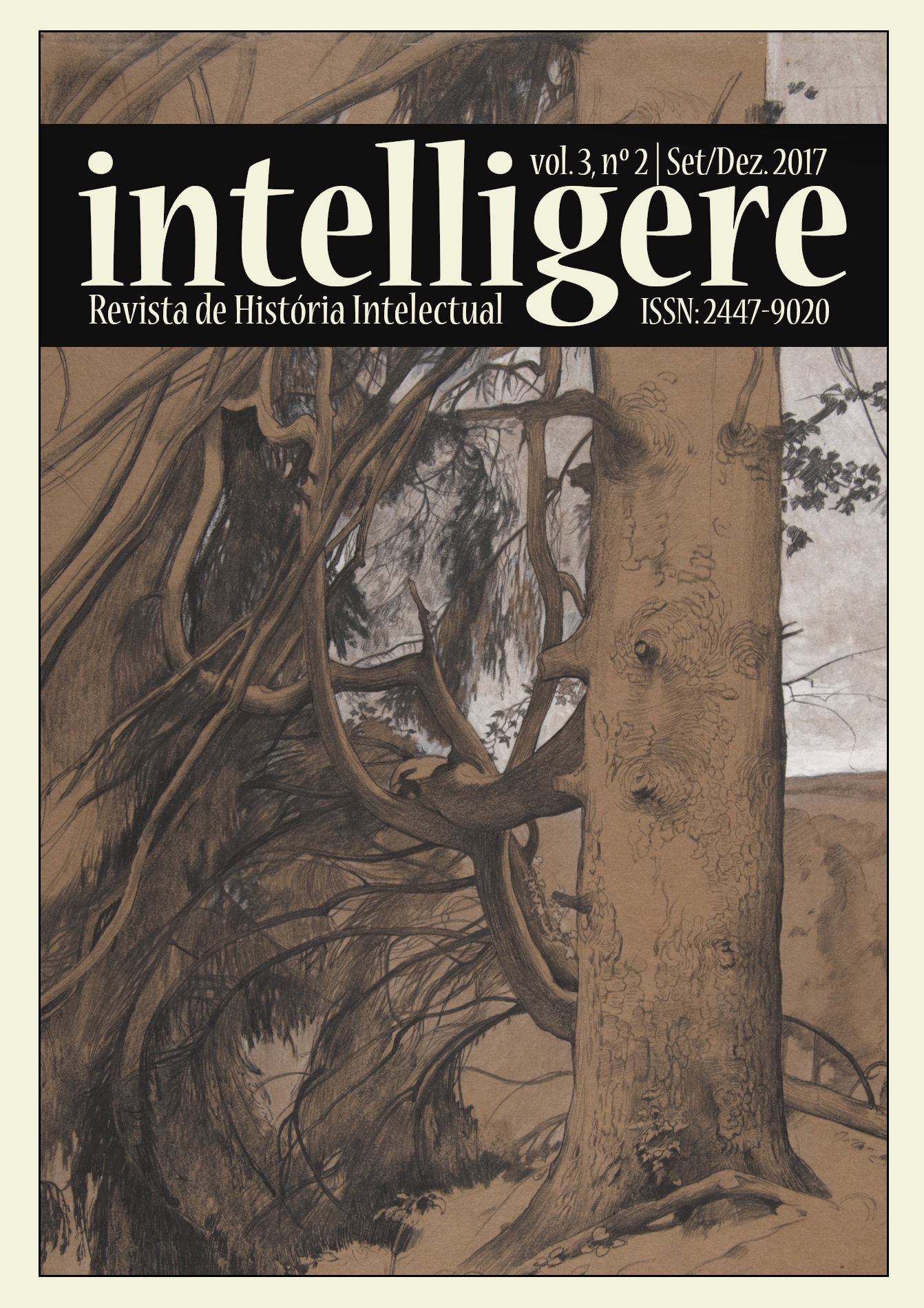History and dialogue between cultures: contributions of Jörn Rüsen’s theory for the temporal orientation of young peple
DOI:
https://doi.org/10.11606/issn.2447-9020.intelligere.2017.130744Keywords:
Rüsen and history education, Historical narratives of young people, Historical consciousness of Portuguese youth.Abstract
The paper discusses the main contributions of Rüsen’s historical consciouseness theory to history education research carried out in Portugal. It analyses epistemological convergences between the two approaches enhancing the relevance of Rüsens’s idea of historical consciousness to the process of learning to think historically. It gives some examples of empirical research on historical accounts of Portuguese youth followed by a reflection about investigative and didactic possibilities oriented to constructing the historical thinking of young people and their temporal orientationDownloads
References
Margaret Donaldson, Childrens’s mind (Londres: Fontana, 1978).
Peter Lee, “Why Learn History?”. In: Learning History, eds. Alaric Dickinson, Peter Lee e Peter Rogers (London, Heinemann Educational Books, 1984).
Raymond Martin, The Past Within Us (Princeton: Princeton University Press, 1989).
David Lowental, The Past is a Foreighn Country (Cambridge: Cambridge University Press, 1985).
Jörn Rüsen, “The development of narrative competence in historical learning: an ontogenetic hypothesis concerning moral consciousness”. In: Studies in metahistory, ed. P. Duvenage (Pretoria, Human Sciences Research Council, 1993).
Projecto Consciência Histórica –Teoria e Práticas (I e II) (financiado pela Fundação para a Ciência e Tecnologia (FCT), Portugal, 2003-2011).
Isabel Barca e Olga Magalhães, “O Passado e o Presente: um estudo no âmbito do Projecto Consciência Histórica – Teoria e Práticas”, O Estudo da História, [vol.] 5 (2004) (66-75).
Marília Gago, “Concepções de Professores sobre narrativa histórica” (Tese de doutorado, Universidade do Minho, 2007).
Maria Auxiliadora Schmidt, “Perspectivas da consciência histórica e da aprendizagem em narrativas de jovens brasileiros”, Revista Tempos Históricos, [vol.] 12, 1 (2008) (81-96).
Júlia Castro, “Diálogo e conflito – pensamento histórico e ideias de interculturalidade de jovens portugueses. In: Aprender História: Perspectivas da Educação Histórica, orgs. M. Auxiliadora Schmidt e Isabel Barca (Ijuí: Unijuí, 2009).
Isabel Barca, “Identities and History: Portuguese students’ accounts”, International Journal of Historical Learning, Teaching and Research, [vol.] 8,1 (2009) (19-27).
Isabel Barca e Maria Auxiliadora Schmidt, “La consciencia histórica de los jóvenes brasileños y portugueses y su relación con la creación de identidades nacionales”, Educatio siglo XXI, [vol.] 31, 1 (2013) (25-45).
Anselm Strauss e Juliet Corbin, Basics of qualitative research. Grounded Theory. Procedures and techniques (Newbury Park: Sage, 1991).
Maria Auxiliadora Schmidt, Isabel Barca e Estêvão Rezende Martins, Jörn Rüsen e o ensino de História (Curitiba-PR: Editora UFPR, 2010).
Estêvão Rezende Martins, “Humanismo: a utopia necessária e sua historicidade”. In: Jörn Rüsen e o ensino de História”, orgs. Maria Auxiliadora Schmidt, Isabel Barca e Estêvão Rezende Martins (Curitiba PR: Editora UFPR, 2010).
Maria Auxiliadora Schmidt e Lucas Pydd Nechi, Brazilian Investigation in history education (Curitiba: W. A. Editores, 2016).
Graça Sanches, “Ideias dos alunos acerca da significância da História Contemporânea: un estudo com alunos do ensino secundário em Cabo Verde” (Dissertação de Mestrado, Universidade do Minho, 2008).
Isabel Barca, “History and temporal orientation: The views of Portuguese-speaking students”. In: Joined-up history: New Directions in History Education Research, eds. Arthur Chapman e Arie Wilschut (Charlotte, NC: Information Age, 2015).
Angelina Aguiares, “Construir conhecimento histórico em contexto angolano: um estudo em torno de uma experiência de aula oficina” (Tese de doutorado, Universidade do Minho, 2017).
Jörn Rüsen, Razão Histórica. Teoria da História: os fundamentos da ciência histórica (Brasília: UniB, 2001).
Jörn Rüsen, “Historical Consciousness: Narrative Structure, Moral Function and Ontogenetic Development”. In Theorizing Historical Consciousness, ed. Peter Seixas (Toronto: University of Toronto Press, 2004).
Peter Lee, “Putting principles into practice: understanding history”. In: How Students Learn, eds. Susanne Donovan e John Bransford (Washington, DC: The National Academies Press, 2005).
Isabel Barca, “A aula oficina em História: do projecto à avaliação”. In: Para uma Educação Histórica de qualidade, org. Isabel Barca (Braga: CIEd, Universidade do Minho, 2004).
Jörn Rüsen, “Humanismo intercultural: ideia e realidade”. In: Humanismo e Didática da História: Jörn Rüsen (Curitiba PR: W.A. editores, 2015).
Jörn Rüsen, Time & History. The variety of cultures (Oxford: Berghahn Books, 2007).
James Wertsch, Voices of Collective Remembering (Cambridge: Cambridge University Press, 2002).
Peter Lee,“Walking backwards into tomorrow”: Historical consciousness and understanding history” (Centre for the Study of Historical Consciousness, University of British Columbia, Vancouver, www.cshc.ubc.ca).
Denis Shemilt, “The Caliph’s Coin: The currency of Narrative Frameworks in History Teaching”. In: Knowing Teaching & Learning History: National and International Perspectives, eds. Peter Stearns, Peter Seixas e Samuel Wineburg (New York: New York University Press, 2000).
Rosalyn Ashby, Peter Lee e Denis Shemilt, “Putting Principles into Practice: Teaching and Planning”. In: How students learn: history in the classroom, eds. M. S. Donavan e J. Bransford (Washington, DC: The National Academies Press, 2005).
Arthur Chapman & Arie Wilschut, Joined-up history: New Directions in History Education Research (Charlotte, NC: Information Age, 2015).
José Sobral e Jorge Vala, “Atitudes Sociais dos Portugueses (ISSP - International Social Survey Programme)” (Instituto de Ciências Sociais da Universidade de Lisboa, 2007).
Maria Auxiliadora Schmidt, “Hipóteses ontogenéticas relativas à consciência moral: possibilidades da consciência histórica de jovens brasileiros”, Educar em Revista, Dossiê: História, epistemologia e ensino: desafios de um diálogo em tempos de incertezas (2011).
Downloads
Published
Issue
Section
License
Autores que publicam em Intelligere concordam com os seguintes termos:
- Autores mantém os direitos autorais e concedem à revista o direito de primeira publicação, com o trabalho simultaneamente licenciado sob a Licença Creative Commons Attribution que permite o compartilhamento do trabalho com reconhecimento da autoria e publicação inicial nesta revista.
- Autores têm autorização para assumir contratos adicionais separadamente, para distribuição não-exclusiva da versão do trabalho publicada nesta revista (ex.: publicar em repositório institucional ou como capítulo de livro), com reconhecimento de autoria e publicação inicial nesta revista.
- Autores têm permissão e são estimulados a publicar e distribuir seu trabalho online (ex.: em repositórios institucionais ou na sua página pessoal), com reconhecimento da autoria e publicação inicial nesta revista.




